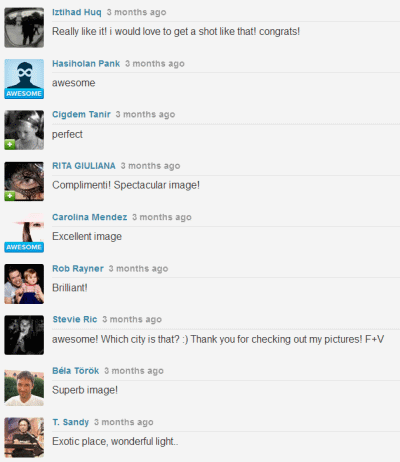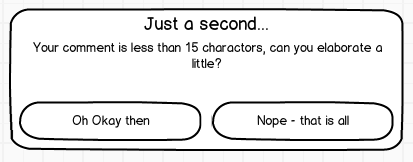In relation to your example, I think it's necessary to consider the question:
Why did the user feel the need to commment vs clicking a "Like" button
Is it because:
- They didn't see the "Like" button?
- They don't want to hide behind the anonymity of a like (or the opposite)?
If it's 1. then your commenting system could, of course, prompt the user to like rather than leave a short comment as a training exercise to teach the user about alternative functionality. You could identify these comments (as noise) by looking for common short phrases like "Nice <insert thing here>", "Your <insert thing here> rocks", or maybe just the number of exclamation marks ;-)
If it's 2. then what's the motivation for it?
Is it because
- The user wants to be identified as a shameless attention seeker?
- The user is hoping to engender reciprocal comments that they might not otherwise receive because they are hidden behind a number?
- The user genuinely wants to show their appreciation in a non-anonymous way?
- The user has something interesting to contribute to the discussion
1 - 3 are really noise. They can swamp 4, which is where the real value lies. Allowing lots of short comments risks increasing your signal-to-noise ratio and drowning out the comments which add value. Would a comment as brilliant as Hemingway's short story be noticed in a flood of 10000 tweets? I'd like to think it would, but I'm pretty sure it would get buried.
However, that raises another question; which is how do you establish worth? Length isn't always a good sign of quality (ahem), and brevity will sometimes make an effective point that 1000 words can never achieve. On the other hand, brevity can also be the sign of a lack of thought or noise.
Length alone is clearly not the deciding factor, but it's likely that there is a good correlation betweeen increased noise and overall length of comment. To reduce this noise, a cap is introduced, and, of course, one of the side effects is to also bar quality short comments.
It is unlikely, though, that you'll get something earth-shattering in less than, say, 15 characters. On the other hand, you'll get rid of:
- Cool Picture!
- Awesome Pic!
- Great Picture!
- Great!!!!!!!! (Personally, I think screening for multiple punctuation marks is a great idea ;-)
I like your picture! however, would pass in this instance, but is also noise. You could, then, also screen for these noisy comments, but that's a science in and of itself.
Although voting on a comment can potentially solve these problems (as you'd hope that quality items would get more votes than non-quality items) the number of times I've seen depressingly pointless comments reach the "top" of the You Tube charts often amazes me.
Popularity isn't necessarily related to awesomeness.
To summarize:
Having a comment cap can be an effective way of reducing noise, but also runs the risk of barring quality short comments. However, if the user is creative anough to come up with a great short comment, they'll certainly overcome a small character limit to make the same point.



 That feels like way too many to me, but the only way you will know is to look at the data of what your users are actually doing.
That feels like way too many to me, but the only way you will know is to look at the data of what your users are actually doing.